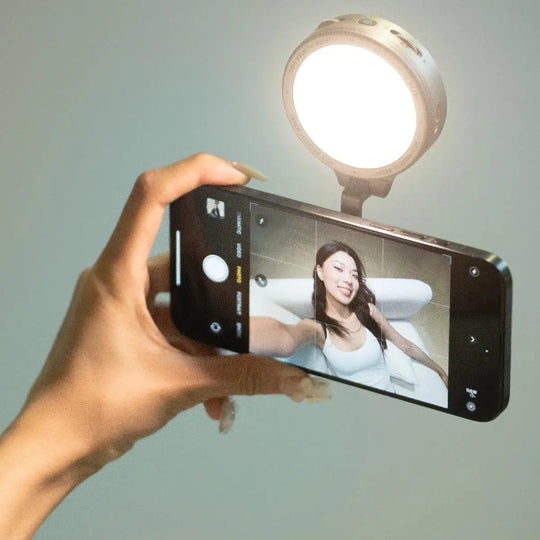Unlock the Secret to Stunning Content: Discover the Magic of Lighting Options!
In the world of content creation, lighting can be the unsung hero that elevates your work from ordinary to extraordinary. Whether you're a seasoned professional or just starting, understanding how to manipulate light can dramatically transform your visual storytelling. Good lighting does more than just illuminate—it's about setting the mood, enhancing the aesthetic appeal, and drawing your audience's attention to the key aspects of your content. From vibrant videos to captivating photographs, the right lighting can make all the difference. In this article, we'll explore various lighting options available to content creators, delving into their benefits and how they can help you achieve stunning results.

Understanding the Basics of Lighting
Before diving into specific types of lighting, it's crucial to grasp some fundamental concepts. Lighting can be categorized into two primary types: hard and soft. Hard light creates sharp shadows, often leading to a dramatic effect, while soft light produces a gentler, more diffused illumination that reduces shadows and flatters subjects. Additionally, understanding color temperature is essential; it influences the mood of your content. For instance, cooler temperatures (blue tones) can evoke feelings of calmness, while warmer temperatures (orange tones) often create a cozy atmosphere. Taking the time to learn these basic principles will empower you to make informed decisions about your lighting setups, ultimately enhancing your content's overall quality and appeal.
Types of Lighting Options for Content Creation
There are several lighting options available to content creators, each with its unique advantages and potential drawbacks. Here are some of the most popular types:
Natural Light
Natural light is often favored by photographers and videographers for its beauty and authenticity. It can create stunning, vibrant images, especially during golden hour—the period shortly after sunrise or before sunset. However, it can be unpredictable; weather conditions and time of day greatly influence its quality. To maximize natural light, consider shooting near windows or outdoors, and use reflectors to bounce light back onto your subjects, reducing harsh shadows. A friend of mine, who is a budding photographer, swears by the golden hour. She often schedules her shoots around this time to capture breathtaking images that require little to no editing.
LED Lights
LED lights have gained immense popularity among content creators due to their energy efficiency and versatility. They come in various shapes and sizes, making them suitable for any setting—be it a home studio or outdoor shoot. One of the standout features of LED lights is their adjustable color temperature, allowing you to customize the lighting to fit your desired mood. Additionally, they generate minimal heat, making them comfortable to work with for extended periods. A friend who runs a YouTube channel transitioned to LED lighting and noticed a significant improvement in her video quality, which in turn attracted more viewers to her content.
Softboxes
Softboxes are essential tools for creating soft, diffused lighting. They work by enclosing a light source within a fabric box, which spreads the light evenly and reduces harsh shadows. This type of lighting is perfect for portrait photography and video interviews, as it flatters the subject's features. Softboxes can be used with various light sources, including LED and fluorescent bulbs. My mentor once mentioned how softboxes transformed the look of his studio setup. He found that the diffused light made his subjects feel more comfortable, resulting in more natural expressions during shoots.
Ring Lights
Ring lights have become a staple for many content creators, particularly in the beauty and lifestyle niches. Their circular design allows for even lighting around the subject, minimizing shadows and highlighting features effectively. Ring lights are especially popular for makeup tutorials and vlogging, as they create a flattering glow. However, they can also be used creatively in various settings. I recall a friend using a ring light for her DIY video content; she loved how it made the colors pop and gave her videos a professional touch without breaking the bank.
Benefits of Using Proper Lighting
Investing in quality lighting can yield substantial benefits for content creators. First and foremost, good lighting improves video quality, ensuring that your content looks polished and professional. It enhances aesthetics, allowing your visuals to stand out in a crowded digital landscape. Furthermore, proper lighting can significantly increase audience engagement; viewers are more likely to stay tuned to content that is visually appealing. A well-lit video or photo can convey professionalism and attention to detail, making your audience more inclined to trust your brand. In a world where first impressions matter, quality lighting is not just an option—it's a necessity for anyone serious about content creation.
Elevating Your Content with Effective Lighting
In conclusion, lighting plays a pivotal role in content creation, and understanding the various options available can greatly enhance your work. Whether you choose natural light, LED lights, softboxes, or ring lights, each type offers unique benefits that can transform your visual storytelling. As you experiment with different lighting setups, consider how each option affects the mood and perception of your content. Remember, the right lighting can make your work shine and resonate with your audience, so take the time to find what works best for you. Happy creating!












